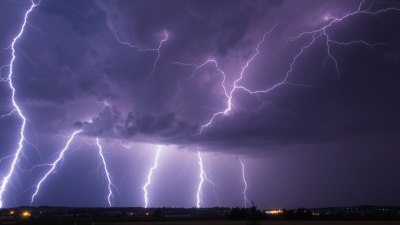How Weather Can Make You Forget What a Budget Is
Explore how varying weather conditions can influence spending habits and budgeting.

Image by prostooleh on Freepik
Most people have a financial plan, a budget that dictates how much money they can spend on entertainment, groceries, bills, and savings. However, we often encounter unforeseen factors that can disrupt even the best-laid plans. One significant yet often overlooked factor is weather. How does the weather impact our financial habits and make us forget what a budget is? In this article, we will explore the intricate relationship between weather patterns and consumer behavior, highlighting the ways in which rain, sunshine, snow, and extreme conditions affect our spending.
The Sunshine Effect
When the sun is shining brightly, people tend to feel more optimistic and willing to spend. It’s a well-documented psychological phenomenon that sunny weather can boost our mood and our willingness to splurge on social activities. According to research, a sunny day can lead to increased spending on things like dining out, shopping, and vacations. People are more likely to gather with friends for outdoor barbecues, go on spontaneous trips, or indulge in ice cream. This seasonal spending spike may lead individuals to temporarily forget their budgeting plans, neglecting to track expenses during the season of warmth and joy.
Rainy Days and Indoor Spending
On the flip side, rainy days can have a completely different impact on our budgets. With outdoor plans thwarted, many people turn to indoor activities that can sometimes lead to increased spending. For instance, individuals may choose to go to the movies, order takeout, or shop online while stuck inside. According to a survey, a majority of consumers reported higher spending on streaming services and home entertainment during rainy weather. This unexpected shift in activity can lead to significant deviations in the budget, especially if one is not careful about tracking expenses. When the rain is pouring outside, some individuals might find themselves justifying unnecessary purchases, forgetting that they had planned to stick to a budget.
The Impact of Seasonal Changes
Various seasons can have different effects on consumer behavior and spending. Spring might awaken a desire to refresh home décor, leading to impulse buys at garden centers and houseware stores. Meanwhile, fall may prompt people to indulge in seasonal foods and clothing, contributing to spending that was not initially incorporated into their budget. Winter holidays also come with their own spending traps, as consumers often forget their financial plans in the face of holiday spirit and festive cheer. Many people end up overspending on gifts, decorations, and food, which can be detrimental to their yearly financial goals. During these times, it is essential for individuals to recognize when the season is influencing their spending habits and to remain steadfast in their budgeting practices.
Extreme Weather Conditions
Natural disasters and extreme weather events can have profound effects on personal finances. Hurricanes, floods, and wildfires do not just bring destruction; they also lead to unexpected expenses. Individuals may need to purchase emergency supplies, temporary housing, or repairs, which can quickly derail a carefully drafted budget. Furthermore, the stress associated with these events can cloud our judgment, leading to impulsive spending as a coping mechanism. For example, after a disaster, individuals might splurge on comfort items or services, attempting to find a semblance of normalcy. Grieving what was lost or disrupted due to adverse weather can lead individuals to forget long-term financial goals when faced with immediate needs.
The Role of Seasonal Discounts
On the brighter side, seasonal changes can also lead to savings opportunities for budget-minded consumers. Retailers often heavily discount items as seasons change, providing a chance to stock up on necessities at lower costs. For example, back-to-school sales in late summer can offer great savings on clothing and supplies, while winter sales can lead to discounts on everything from holiday decor to warm clothing. However, the key is not to get carried away with these sales; budget-conscious shoppers need to resist the urge to purchase items they don’t need, just because they are on sale. When people become overly excited about seasonal discounts, they might forget to ask themselves whether an item is actually a necessity, or if it’s merely an impulse buy fueled by aggressive marketing campaigns.
Emotional Spending Linked to Weather
Research suggests that weather can affect our emotions, which in turn can impact spending behaviors. The concept of emotional spending is when individuals make purchases based on their emotional state rather than practical financial plans. During periods of unfavorable weather, such as extended rain or gloomy days, some individuals might engage in retail therapy to lift their spirits. This can lead to increased spending on items that are not accounted for in a budget, further complicating financial well-being. Conversely, when the weather is pleasant, people may feel more motivated to engage in social activities that require spending, such as dining out or attending events. This creates a cycle where emotional states dictated by the weather can lead to financial decisions that aren’t aligned with budgetary goals.
Adapting Your Budget
Given that weather can directly influence our financial habits, adapting a budget to account for these fluctuations may lead to better outcomes. Consider creating a flexible budget that can accommodate summer splurges or rainy day indoor spending. For example, allocating a ‘weather contingency’ fund could be beneficial to cover additional costs when the weather doesn’t cooperate. By planning for unexpected weather-related expenses, you can maintain a degree of financial control, even when external factors tempt you to stray from your budget.
Psychological Preparedness
Awareness of the psychological effects that weather can have on spending behavior is crucial for financial success. Individuals can practice mindfulness and self-awareness, which can help to combat impulsive spending during certain weather patterns. Keeping track of spending habits during different seasons and identifying triggers related to weather can also provide valuable insights. By understanding how external conditions influence their emotional responses towards spending, individuals can build strategies to remain grounded during periods of weather-induced financial temptation.
Weather can significantly influence our spending habits and can cause individuals to forget their established budgets. Whether it’s the optimism of a sunny day, the gloominess of rain, or the festive spirit of the holiday season, many factors linked to weather can lead to deviation from financial plans. By recognizing these influences and adapting budgets accordingly, consumers can help maintain financial discipline, regardless of what the weather brings. It’s important to cultivate awareness about how our environment affects our emotions and, subsequently, our financial behaviors, enabling us to approach spending with greater intention and restraint.











